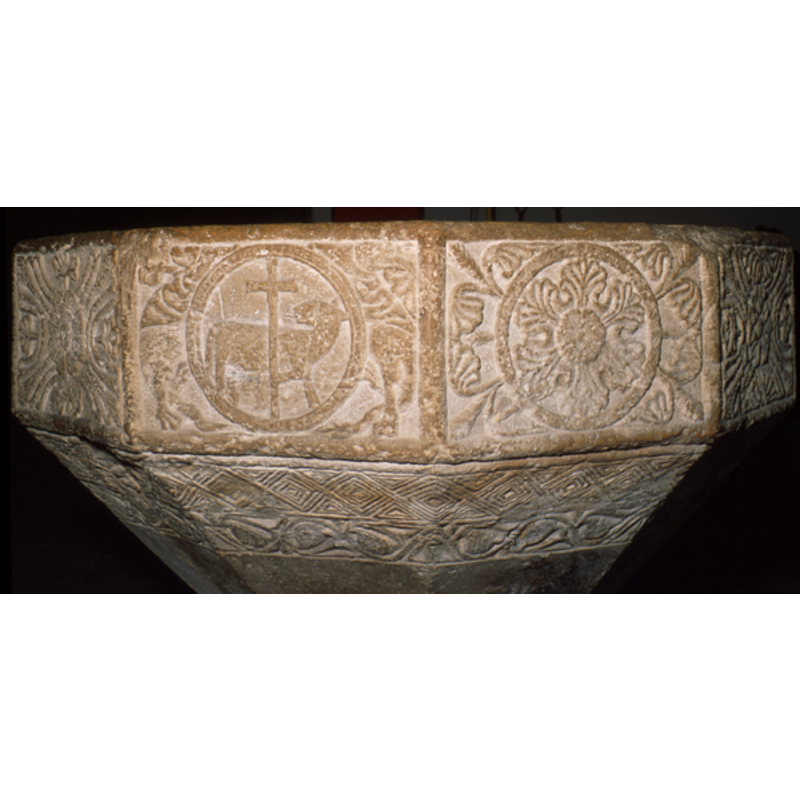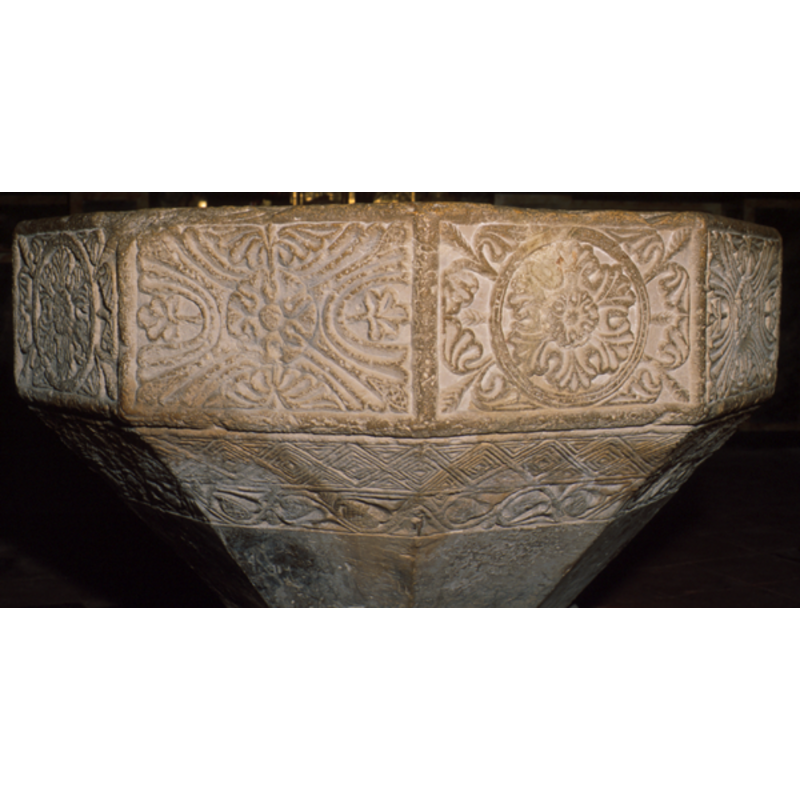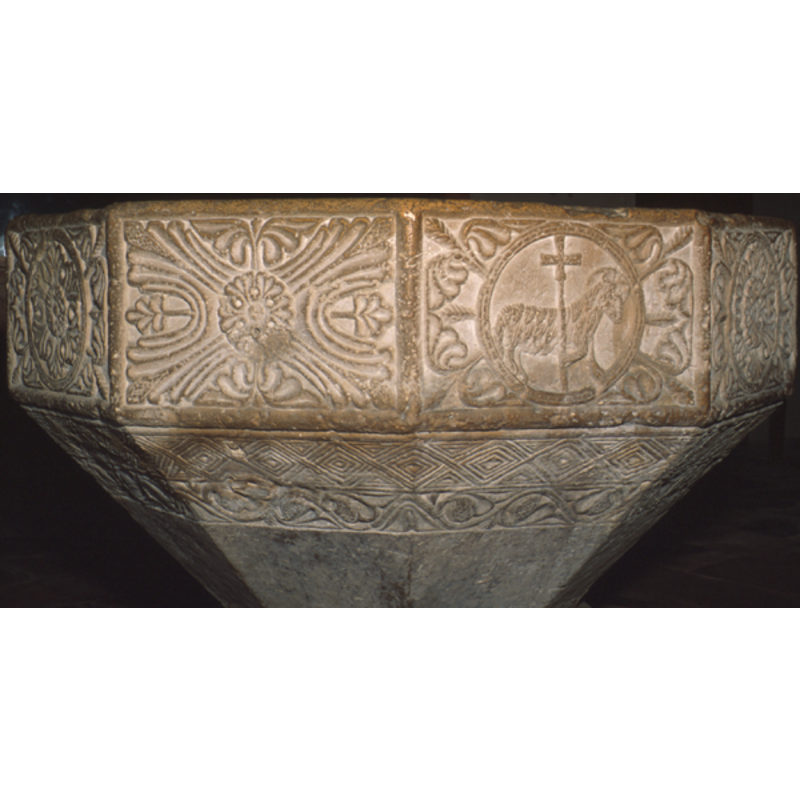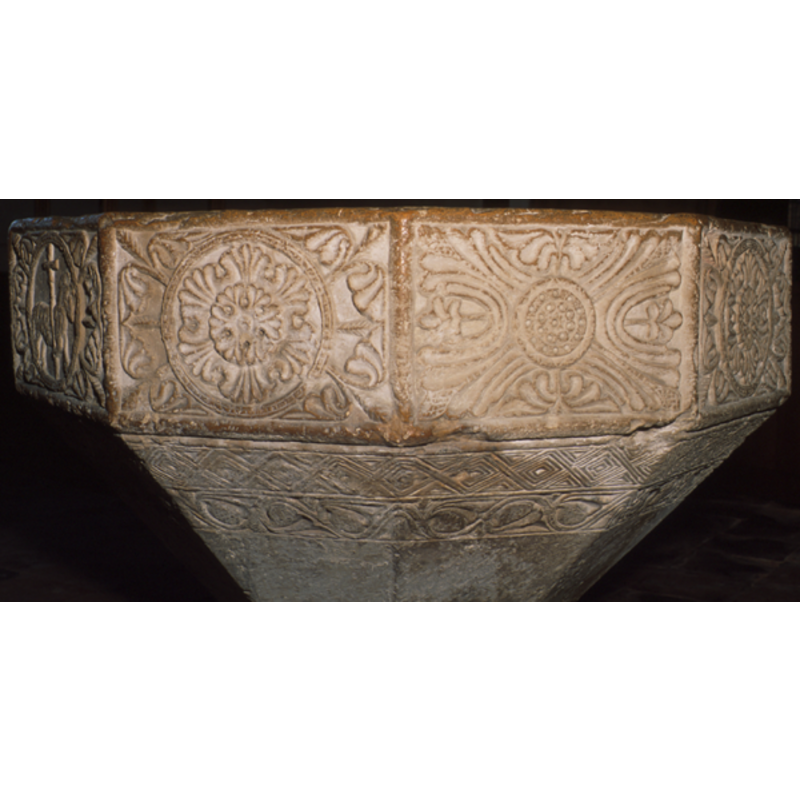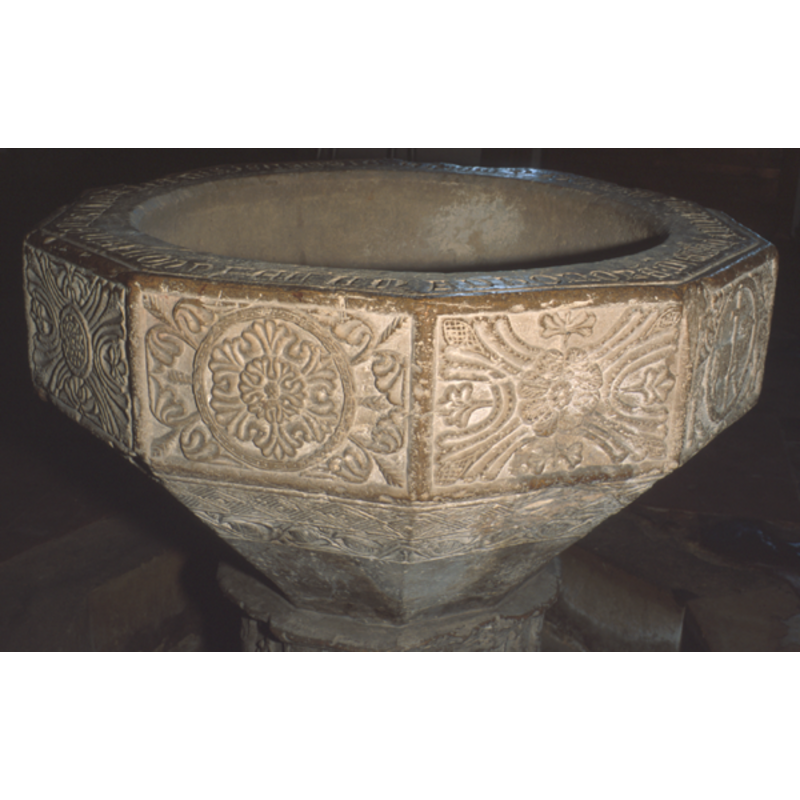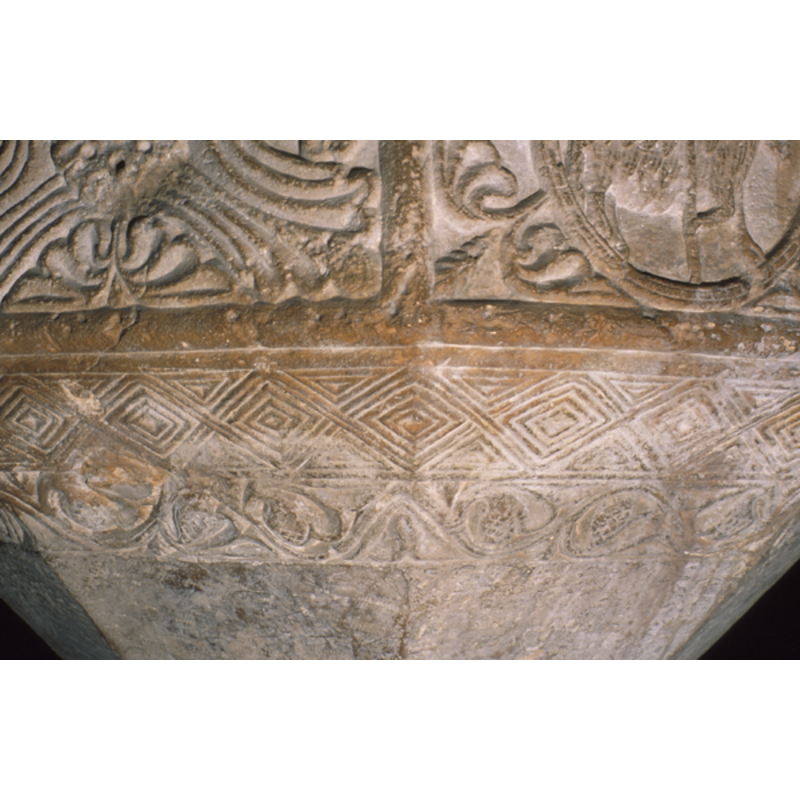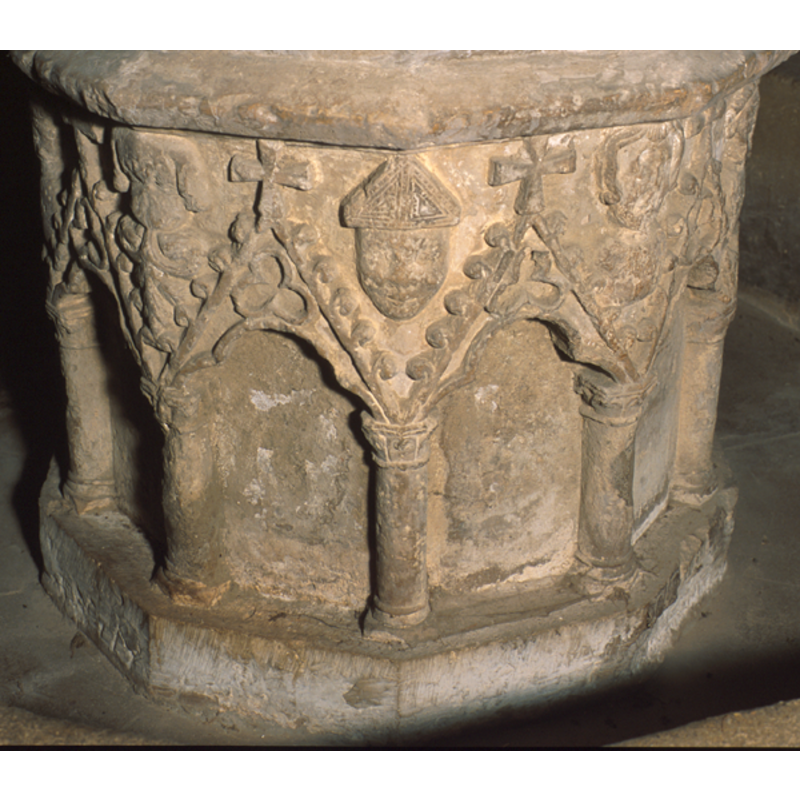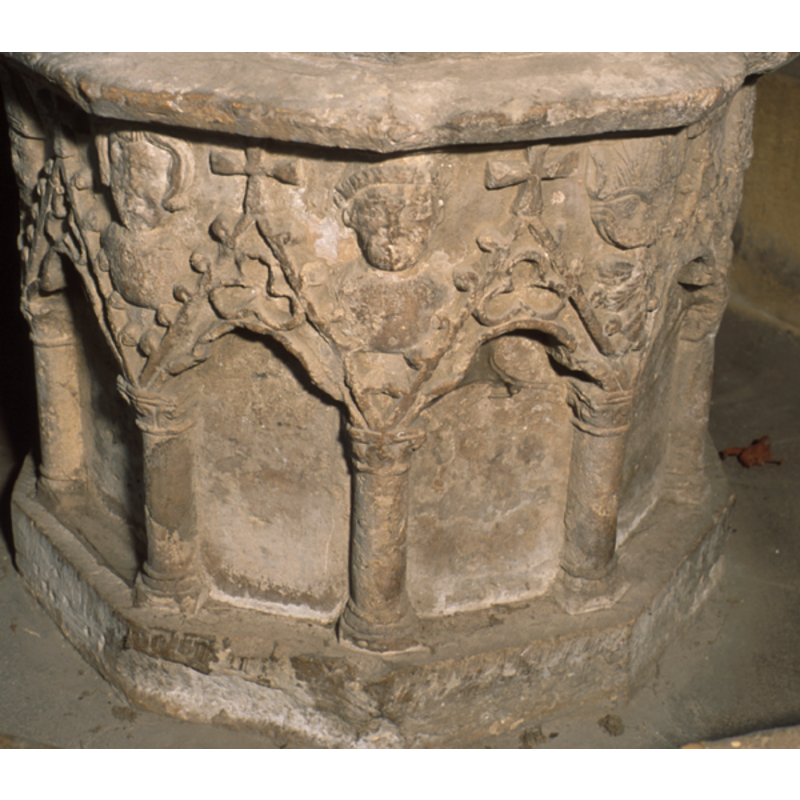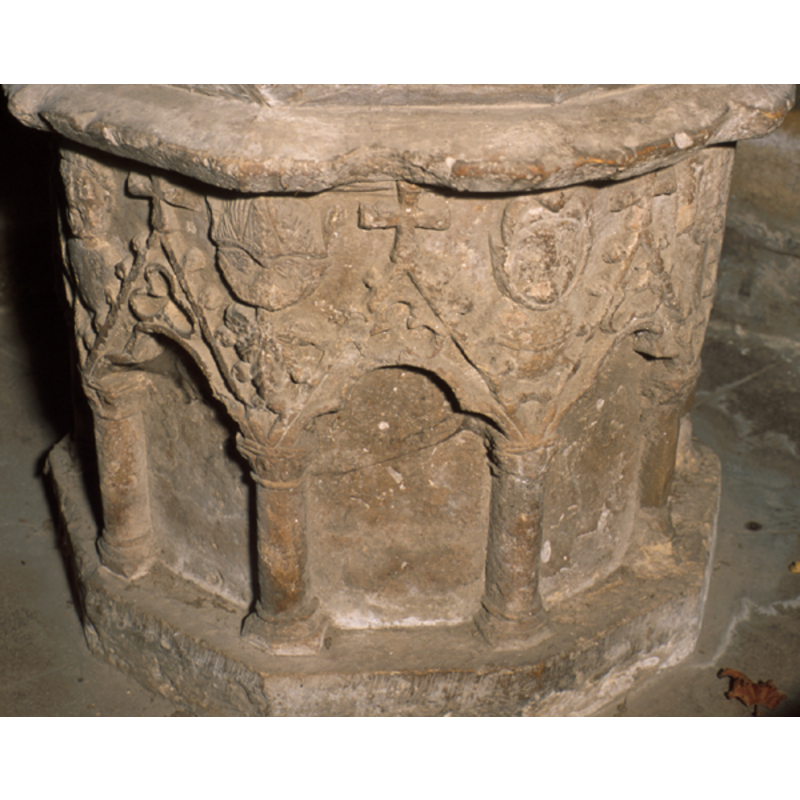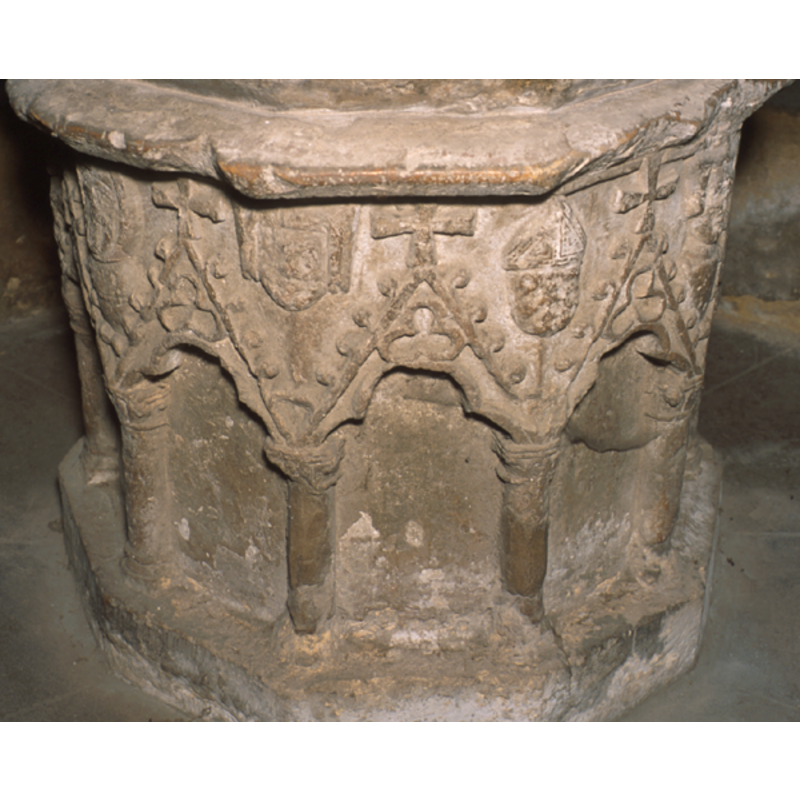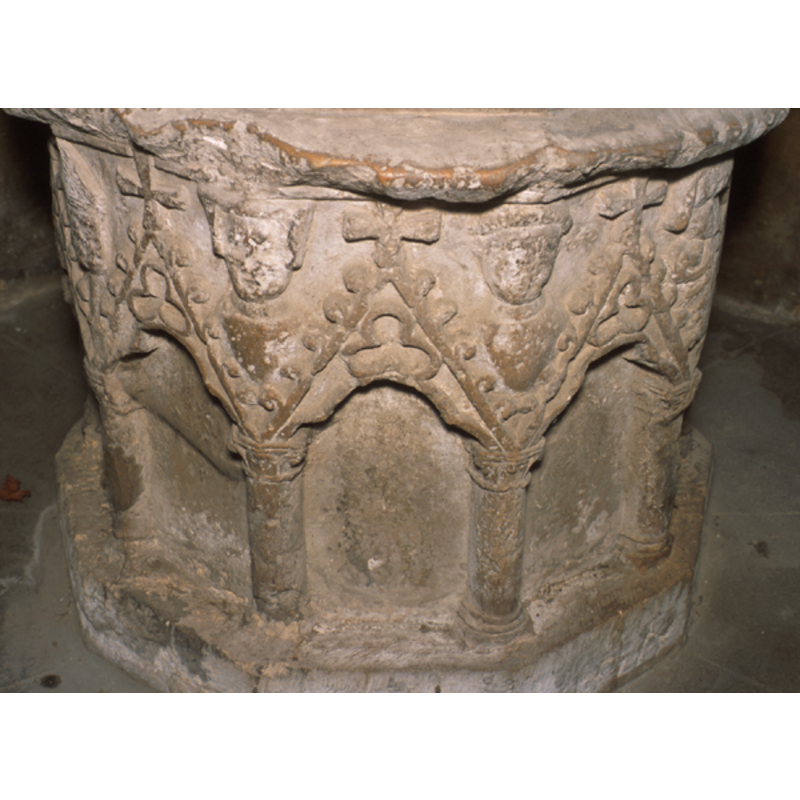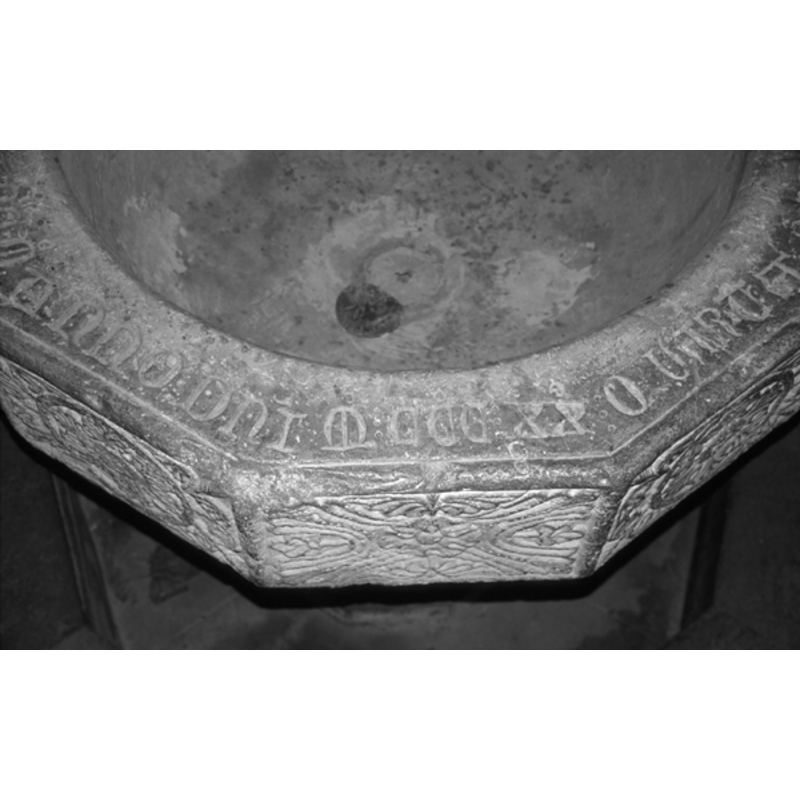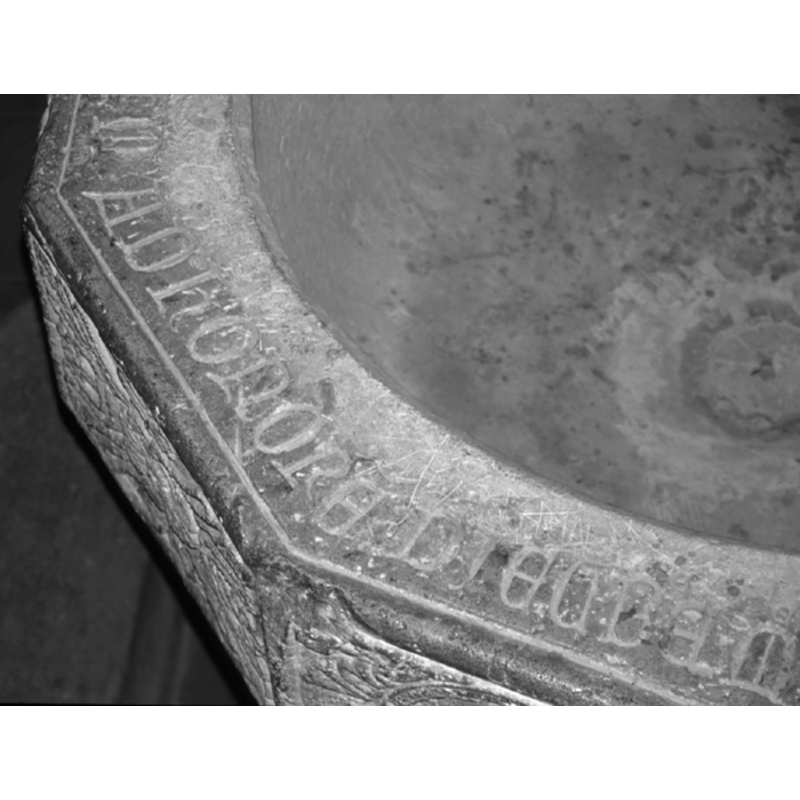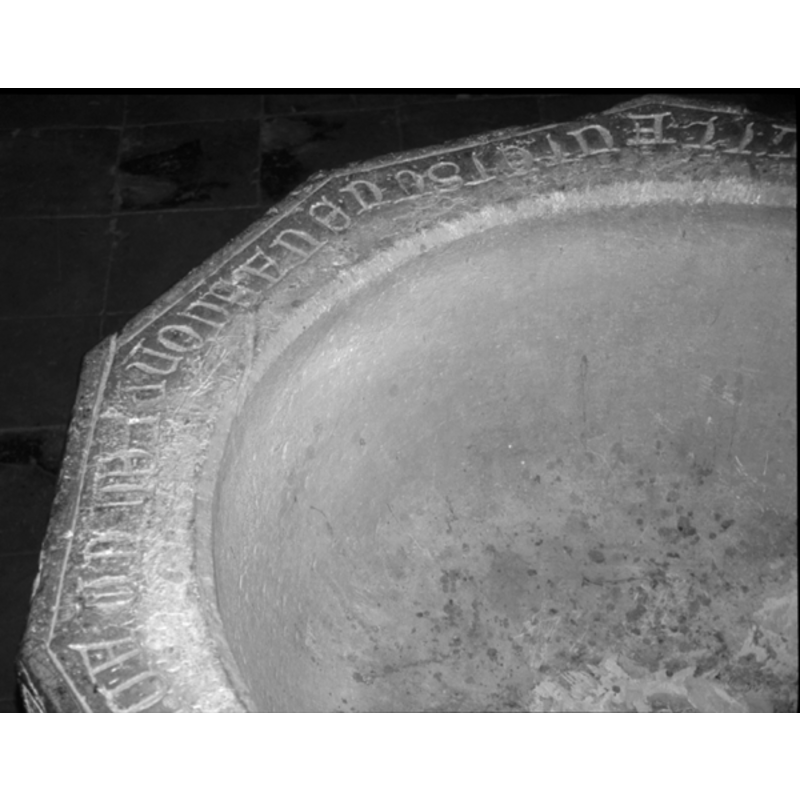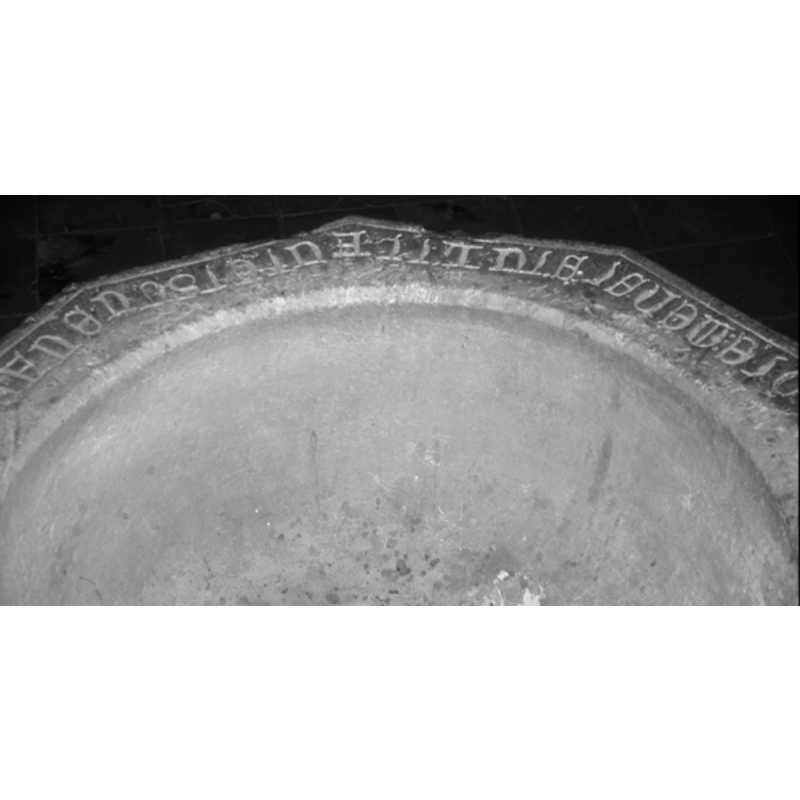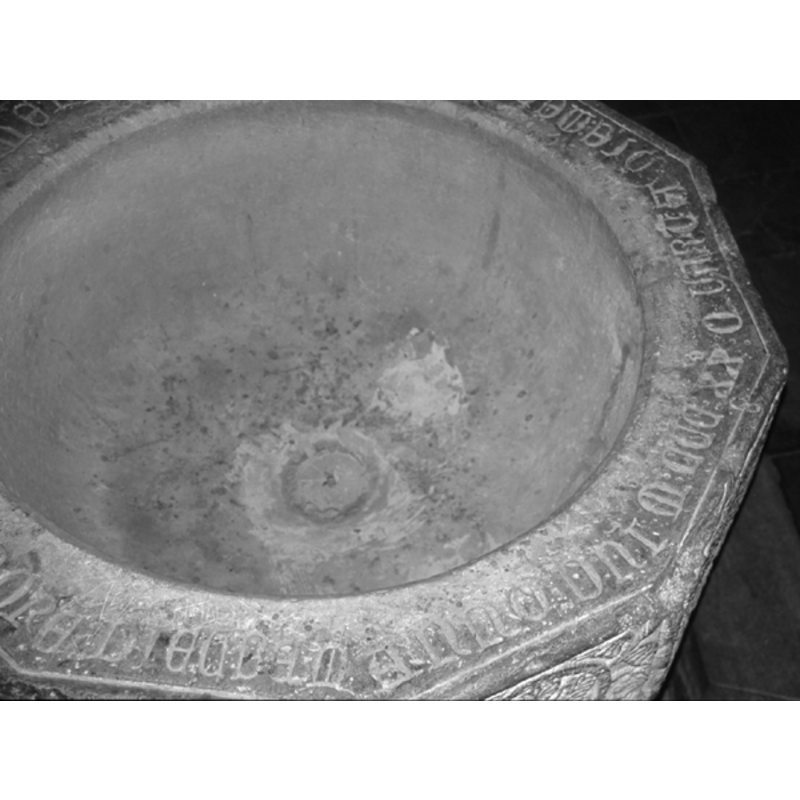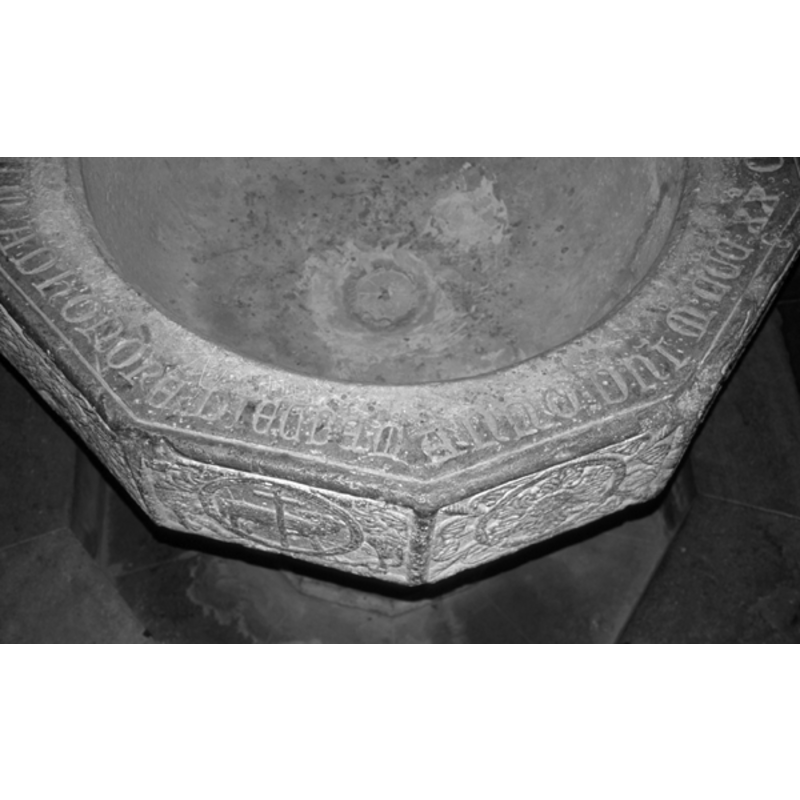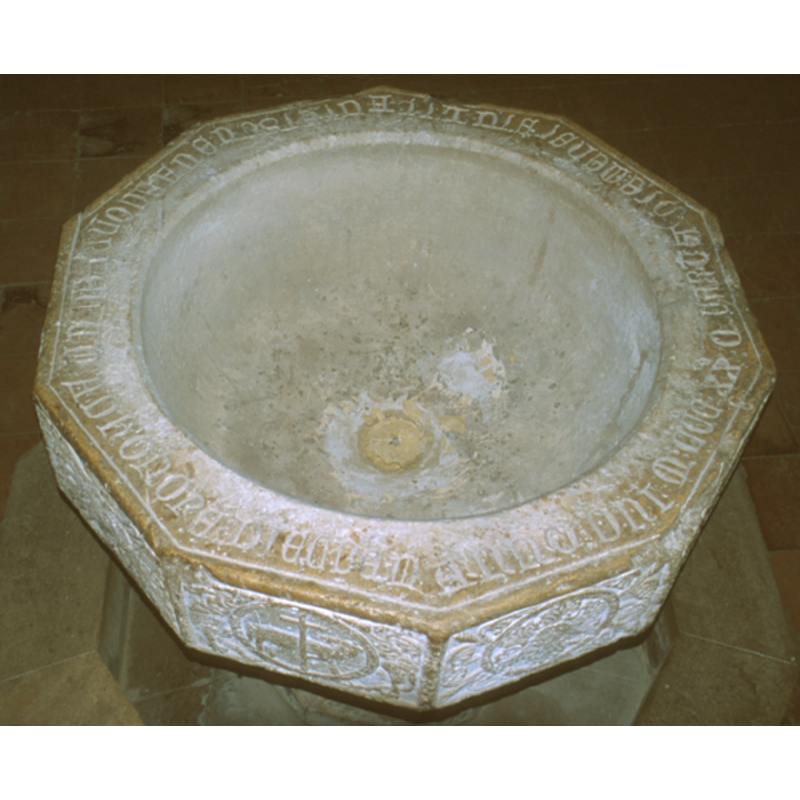Cazeres No. 1 / Cazères sur Garonne
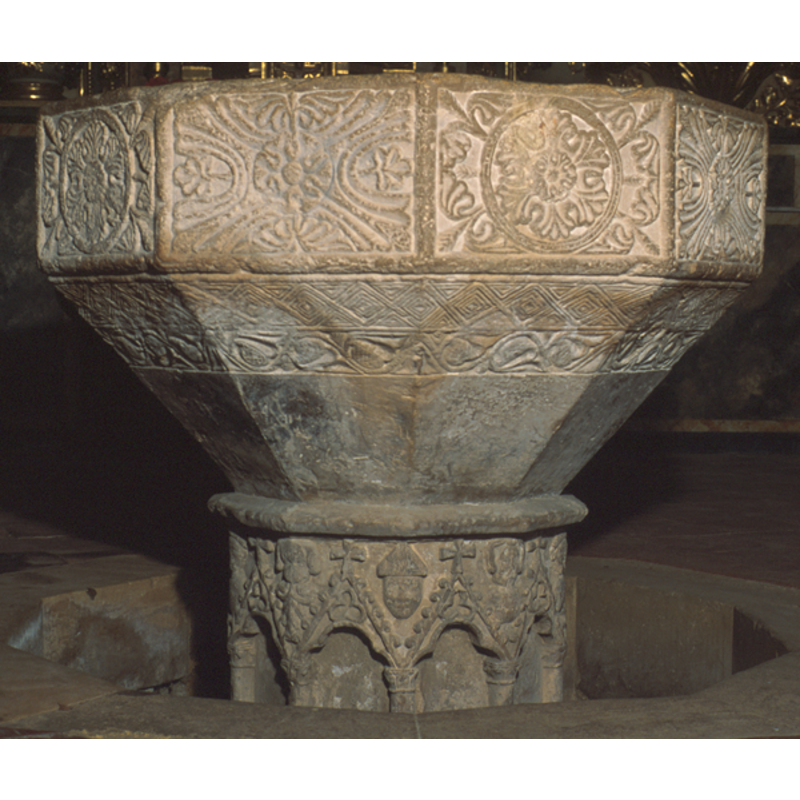
Image copyright © Baptisteria Sacra Index, 2023
CC-BY-NC-ND-4.0
Results: 34 records
B01: Christ - Agnus Dei - in a circle - in a floral frame
B02: design element - motifs - floral
B03: design element - motifs - floral
B04: design element - motifs - floral
B05: design element - motifs - floral
B06: Christ - Agnus Dei - in a circle - in a floral frame
B07: design element - motifs - floral
B08: design element - motifs - floral
B09: design element - motifs - floral
B10: design element - motifs - floral
BU01: design element - patterns - geometric
BU02: design element - motifs - garland
LB01: design element - architectural - arcade - blind - trefoiled arches - 10 - cusped
LB02: cleric - bishop - head
LB03: human figure - male - head
LB04: cleric - monk - head
LB05: animal - head
LB06: human figure - head
LB07: human figure - head
LB08: cleric - bishop - head
LB09: human figure - male - head
LB10: cleric - monk - head
LB11: human figure - male - head
LB12: design element - motifs - trefoil
LB13: symbol - cross
R01: inscription
R02: inscription
R03: inscription
R04: inscription
R05: inscription
R06: inscription
view of font
view of basin
INFORMATION
Font ID: 04123CAZ
Object Type: Baptismal Font1
Date Visited: 2001-07-06
Font Date: 24 July 1320 [base only]
Font Century and Period/Style: 14th century (early) [base only], Medieval [composite]
Cognate Fonts: Mesplé (1970: 136) gives the fonts at nearby Lias and Mauran as related in decoration
Church / Chapel Name: Église Notre-Dame-de-l'Assomption
Font Location in Church: In the former sacristy, now used as treasure room or museum
Church Patron Saint(s): The Assumption of St. Mary the Virgin
Church Notes: church listed in Mérimée [ref.: PA00094312]: "L'église remonterait au début du 14e siècle et a été plusieurs fois remanié."
Church Address: Pl. de L Hôtel de ville, 31220 Cazères, France
Site Location: Haute-Garonne, Occitanie, France, Europe
Directions to Site: Located off the D6-D10 crossroads. 35 km ENE of Saint-Gaudens, about 55 km SW of Toulouse
Ecclesiastic Region: Diocese de Toulouse
Additional Comments: composite font (Romanesque basin on a Gothic base)
Font Notes:
Click to view
Described in the Dictionnaire des églises.. (1966- ) as a baptismal font of mixed style dating from 1320; the Romanesque basin is decagonal and ormanented on its sides with foliage, interlace, Agnus Dei, etc.; the Gothic base is ornamented with trefoil arches. [NB: the date 1320 is given as the date of completion of the font ("achevés en 1320")]. Described and illustrated in Mesplé (1970: 133-134 and figs. 1-2) who gives the fonts at nearby Lias and Mauran as related in decoration. Font listed in Palissy [ref.: PM31000124]: "Fonts baptismaux [...] Calcaire [...] 1320 [...] Cuve de forme octogonale [...] Cuve de forme octogonale [...] Cuve baptismale de l'époque romane à laquelle on a ajouté en 1320 le pied." Illustrated in Mémoire [ref.: APMH00079513, APMH00079514, AP65V01494, AP31W00937, AP31W00938, AP31W00939].
On-site notes: this is a beautifully carved basin of the Romanesque period mounted on a Gothic base. The whole surface of the basin is covered in busy ornamentation, symbols or inscriptions, except the very bottom of the underbowl. An inscription extends all around the upper surface of the rim [cf. Inscription]. The ten panels of the basin sides are: 1)haloed Agnus Dei with cross and head forward, in a circle and inside a floral window; 2)circular floral motif; 3)cross-shaped floral motif; 4)circular floral motif; 5)diagonal floral motif; 6) Agnus Dei with cross and head turned back, in a circle inside a floral window; the "lamb" looks more like a dog and appears to stick its tongue out at the cross; there is also a dragon in the floral window; 7)circular floral motif; 8)diagonal floral motif; 9)circular floral motif; 10)diagonal floral motif [NB: M. l'abbé, who was very generous and extremely patient and helpful during our work in this church, pointed out that the two clearly different "Agni Dei" had to have some meaning; he suggested the possibility of a "before-and-after" sequence in relation to baptism, especially since they are located at opposite sides of the basin and they are the only animated symbols on the basin, the rest being floral and decorative. We are most grateful to him for all his help]. The upper and middle registers of the underbowl are ornamented with a diamond motif pattern and a vine respectively. The Gothic base, almost half of which is at below-the-ground level [the original floor of the sacristy is now well over a foot below the present one], has a blind arcade of cusped trefoil arches; it is quite likely that these arches had originally either statuettes or painted contents in them, but they are now blank; the spandrels, however, are busy with a number of heads and motifs: bihop, male, monk, beast, head?, head?, bishop, male, monk, male; each arch bears a trefoil in its upper angle and is topped with a cross. [NB: A sunken baptismal font from an Early-Christian baptistery found nearby has been reconstructed in a porch outside the church; cf. Index entry for Cazères Nos. 2 & 3 for details]
On-site notes: this is a beautifully carved basin of the Romanesque period mounted on a Gothic base. The whole surface of the basin is covered in busy ornamentation, symbols or inscriptions, except the very bottom of the underbowl. An inscription extends all around the upper surface of the rim [cf. Inscription]. The ten panels of the basin sides are: 1)haloed Agnus Dei with cross and head forward, in a circle and inside a floral window; 2)circular floral motif; 3)cross-shaped floral motif; 4)circular floral motif; 5)diagonal floral motif; 6) Agnus Dei with cross and head turned back, in a circle inside a floral window; the "lamb" looks more like a dog and appears to stick its tongue out at the cross; there is also a dragon in the floral window; 7)circular floral motif; 8)diagonal floral motif; 9)circular floral motif; 10)diagonal floral motif [NB: M. l'abbé, who was very generous and extremely patient and helpful during our work in this church, pointed out that the two clearly different "Agni Dei" had to have some meaning; he suggested the possibility of a "before-and-after" sequence in relation to baptism, especially since they are located at opposite sides of the basin and they are the only animated symbols on the basin, the rest being floral and decorative. We are most grateful to him for all his help]. The upper and middle registers of the underbowl are ornamented with a diamond motif pattern and a vine respectively. The Gothic base, almost half of which is at below-the-ground level [the original floor of the sacristy is now well over a foot below the present one], has a blind arcade of cusped trefoil arches; it is quite likely that these arches had originally either statuettes or painted contents in them, but they are now blank; the spandrels, however, are busy with a number of heads and motifs: bihop, male, monk, beast, head?, head?, bishop, male, monk, male; each arch bears a trefoil in its upper angle and is topped with a cross. [NB: A sunken baptismal font from an Early-Christian baptistery found nearby has been reconstructed in a porch outside the church; cf. Index entry for Cazères Nos. 2 & 3 for details]
Credit and Acknowledgements: We are grateful to M. l'abbé, who was very generous and extremely patient and helpful during our work in this church
COORDINATES
UTM: 31T 344576 4785414
Latitude & Longitude (Decimal): 43.20551, 1.08679
Latitude & Longitude (DMS): 43° 12′ 19.84″ N, 1° 5′ 12.44″ E
MEDIUM AND MEASUREMENTS
Material: stone, sandstone
Number of Pieces: two?
Font Shape: decagonal, mounte
Basin Interior Shape: round
Basin Exterior Shape: decagonal
Drainage System: centre hole in basin
Drainage Notes: the hole is now plugged/cemented
Rim Thickness: 16-20 cm
Diameter (inside rim): 90-91 cm
Diameter (includes rim): 123-128 cm [Mesplé gives 140 cm]
Basin Depth: 42 cm
Height of Basin Side: 26 cm
Basin Total Height: 67 cm
Height of Base: 56 cm
Basin Upper Panel Dimensions: 26 x 40 cm
Font Height (less Plinth): 123 cm*
Notes on Measurements: BSI *[NB: this height is in relation to the original floor; the font is now at a confortable 97 cm height from the current floor, therefore being at the usual font height of approximately 100 cm.]
INSCRIPTION
Inscription Language: Latin
Inscription Location: upper surface of the rim
Inscription Text: "FUIT ISTUD VAS COMPLETUM AD HONOREM DOMINI ET BEATAE MARIAE ANNO DOMINI MXXX VIGESIMO QUARTA DIE JULH"
Inscription Notes: transcription in Mesplé
Inscription Source: Mesplé (1970: 134)
REFERENCES
- Dictionnaire des églises de France, Belgique, Luxembourg, Suisse, Paris: R. Laffont, 1966-, III A 46
- France, Ministère de la culture, Inventaire Général, Mémoire / POP : la plateforme ouverte du patrimoine (Ministère de la culture, Inventaire Général), 2024. URL: https://www.pop.culture.gouv.fr/search/mosaic?base=%5B%22Photographies%20%28M%C3%A9moire%29%22%5D.
- France, Ministère de la culture, Inventaire Général, Mémoire / POP : la plateforme ouverte du patrimoine (Ministère de la culture, Inventaire Général), 2024. URL: https://www.pop.culture.gouv.fr/search/mosaic?base=%5B%22Photographies%20%28M%C3%A9moire%29%22%5D.
- France, Ministère de la culture, Inventaire Général, Mémoire / POP : la plateforme ouverte du patrimoine (Ministère de la culture, Inventaire Général), 2024. URL: https://www.pop.culture.gouv.fr/search/mosaic?base=%5B%22Photographies%20%28M%C3%A9moire%29%22%5D.
- France, Ministère de la culture, Inventaire Général, Mémoire / POP : la plateforme ouverte du patrimoine (Ministère de la culture, Inventaire Général), 2024. URL: https://www.pop.culture.gouv.fr/search/mosaic?base=%5B%22Photographies%20%28M%C3%A9moire%29%22%5D.
- France, Ministère de la culture, Inventaire Général, Mémoire / POP : la plateforme ouverte du patrimoine (Ministère de la culture, Inventaire Général), 2024. URL: https://www.pop.culture.gouv.fr/search/mosaic?base=%5B%22Photographies%20%28M%C3%A9moire%29%22%5D.
- France, Ministère de la culture, Inventaire Général, Mémoire / POP : la plateforme ouverte du patrimoine (Ministère de la culture, Inventaire Général), 2024. URL: https://www.pop.culture.gouv.fr/search/mosaic?base=%5B%22Photographies%20%28M%C3%A9moire%29%22%5D.
- France, Ministère de la culture, Inventaire Général, Palissy (France, Ministère de la culture), France, Ministère de la culture. URL: http://www.culture.fr/public/mistral/palissy.
- Mesplé, Paul, "Fonts baptismaux commingeois du XIVe siècle", 83, 2-3, Revue de Comminges (Pyrénées Centrales), 1970, pp. 133-140; p. 132-134, 136 and figs. 1-2
- Miquel, Caroline, "Monuments et mobilier de la période mediévale du canton de Rieumes (Haute-Garonne)", 1997, 12, Archéo en Saves, 1997, pp. 33-65; p. 54
